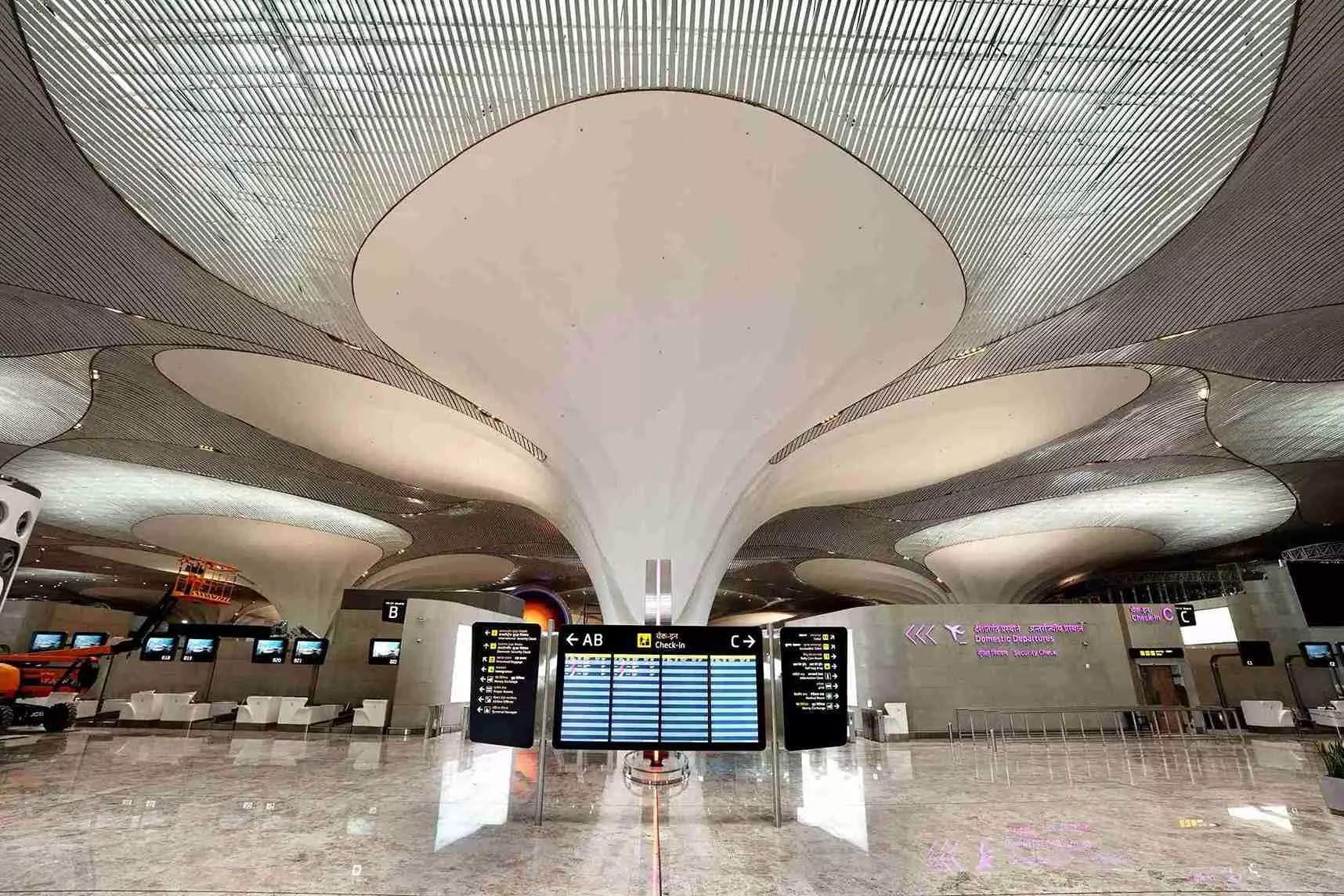
Interiors of the newly-constructed Navi Mumbai International Airport (NMIA) ahead of the inauguration of its first phase, in Navi Mumbai, Maharashtra. PTI
PM Modi to inaugurate Navi Mumbai airport, Mumbai Metro Line 3 on Oct 8
Built at Rs 19,650 crore, phase one of the Navi Mumbai International Airport is India’s largest Greenfield airport and the first airport in India to be connected by water taxi

Prime Minister Narendra Modi will on Wednesday (October 8) inaugurate the Navi Mumbai International Airport and a section of the Mumbai Metro Line, marking significant milestones in improving transportation in the financial capital.
Spread across 1,160 hectares, the airport is designed for high efficiency and will eventually handle 90 million passengers annually and 3.25 million metric tonnes of cargo.
India’s largest greenfield airport
Built at a cost of Rs 19,650 crore, phase one of the Navi Mumbai International Airport is India’s largest Greenfield airport project, developed under a Public-Private Partnership.
Also read: Mumbai-Ahmedabad bullet train: 4.88-km tunnel boring done; know all about project
As the second international airport for the Mumbai Metropolitan Region, NMIA will work alongside the Chhatrapati Shivaji Maharaj International Airport to ease congestion and position Mumbai among global multi-airport cities.
Notable features include an Automated People Mover system connecting all four passenger terminals for smooth inter-terminal transfers, as well as a landside APM linking the city-side infrastructure.
In line with sustainable practices, NMIA will have dedicated storage for Sustainable Aviation Fuel, solar power generation of around 47 MW, and electric bus services for city connectivity. It will also be the first airport in India to be connected by water taxi.
Mumbai metro line 3 phase 2B
The Prime Minister will also inaugurate Phase 2B of the Mumbai Metro Line 3, which stretches from Acharya Atre Chowk to Cuffe Parade, constructed at an estimated cost of Rs 12,200 crore.
With this phase, the entire Mumbai Metro Line 3, also called the Aqua Line, costing over Rs 37,270 crore, will be operational. This fully underground line is set to transform commuting across the Mumbai Metropolitan Region, offering a faster, more efficient, and modern transit solution for millions of residents.
Spanning 33.5 kilometers from Cuffe Parade to Aarey JVLR with 27 stations, Metro Line 3 will serve around 1.3 million passengers daily. Phase 2B will provide direct connectivity to South Mumbai’s heritage and cultural districts such as Fort, Kala Ghoda, and Marine Drive, as well as key administrative and financial hubs including the Bombay High Court, Mantralaya, Reserve Bank of India, Bombay Stock Exchange, and Nariman Point.
The metro has been designed to integrate seamlessly with other modes of transport, including railways, airports, other metro lines, and monorail services, enhancing last-mile connectivity and reducing congestion across the metropolitan region.
Mumbai One app
Modi will also launch the Mumbai One App, an integrated common mobility platform covering 11 public transport operators, including Mumbai Metro Lines 1, 2A, 3, and 7, Mumbai Monorail, Navi Mumbai Metro, suburban railways, and major bus services.
The app will offer integrated mobile ticketing across multiple transport operators, eliminate queuing through digital transactions, and provide seamless multi-modal connectivity with a single dynamic ticket.
Commuters can access real-time updates on delays, alternative routes, and estimated arrival times, along with map-based information on nearby stations, attractions, and points of interest. An SOS feature ensures commuter safety.
Short-term employability programme
Additionally, the Prime Minister will inaugurate the Short-Term Employability Programme, a pioneering initiative by the Department of Skill, Employment, Entrepreneurship, and Innovation in Maharashtra.
The program will be implemented across 400 government ITIs and 150 government technical high schools, aligning skill development with industry requirements to enhance employability. STEP will establish 2,500 new training batches, including 364 exclusive batches for women and 408 batches in emerging technology courses such as Artificial Intelligence, Internet of Things, Electric Vehicles, Solar energy, and Additive Manufacturing.
(With agency inputs)

